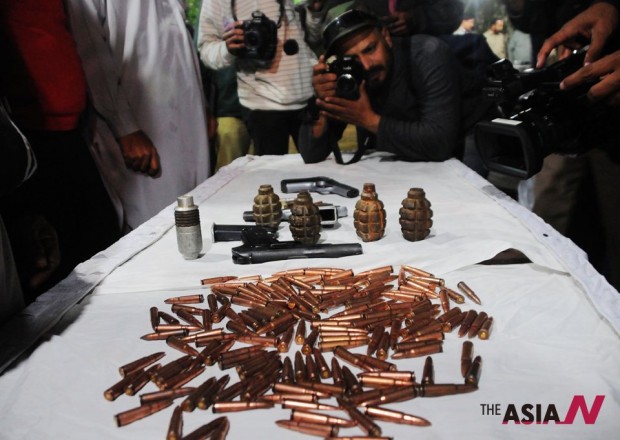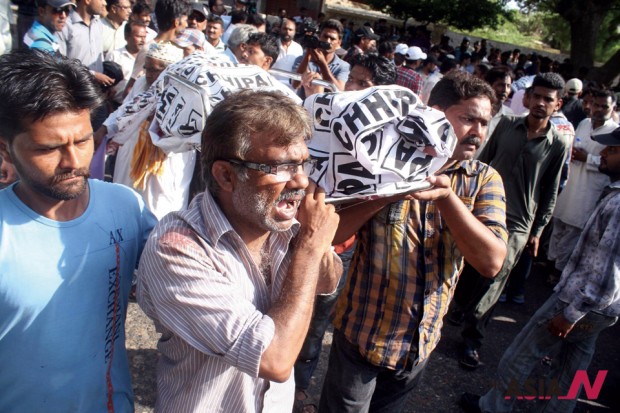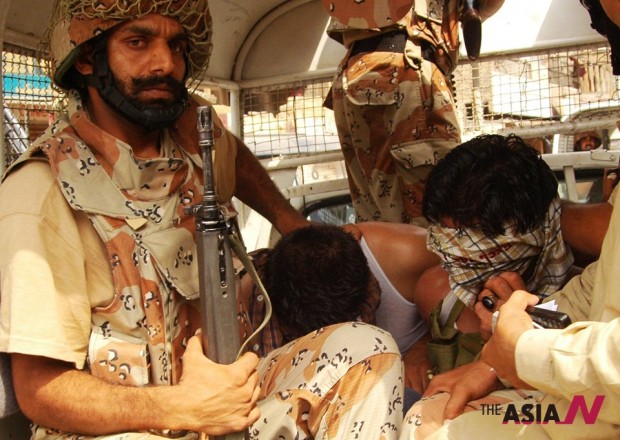Pakistan, a nation hostage to criminals

Pakistani policemen display weapons and hand grenades at a police station in southern Pakistani port city of Karachi in February, 2012. Pakistani crime investigation department (CID) foiled a terrorist activity and arrest one suspect.(Photo : Xinhua)
The entire Pakistani nation is virtually hostage to terrorists, kidnappers, killers and other criminals, as the number of crimes including heinous crimes like murders, kidnapping for ransom, highway robberies, bank robberies, rape, gang-rape, extortion, car and bike theft and snatching, shooting dead for a mobile phone and other street crimes run in hundreds of thousands annually. The victims include all citizens male and female hailing from diverse sections of society like factory workers, industrialists, traders, shopkeepers, land-holders, doctors, engineers, students, teachers, university professors and even vice chancellors.
I am sure that almost no country around the globe could claim to be free of these kinds of crimes, but Pakistan is among the countries that top the list, as the situation here has deteriorated with every passing day for the last 36 years. Nobody knows the exact crime figures in the country as many cases go unreported, but even the official data compiled by the police department presents a horrible picture. According to official data, the number of crimes registered in Pakistan is around half a million. In Punjab province, over two hundred thousand crimes are registered annually while in Sindh province it is around one hundred thousand, of which half the crimes take place in the provincial capital of Karachi alone. Khyber Pakhtunkhaw province, bordering Afghanistan, and the Balochistan province, bordering Afghanistan and Iran, has a ratio of crimes similar to Sindh, but they are mostly terrorism acts, as they are jolted by bomb blasts almost every day.
Until the third quarter of the 1970s, there was comparative peace in the country as the people used to go out and travel without being scared. The highways were safe and people preferred travelling at night because of the 8-month long sizzling summer season. The shops in all the cities and towns would remain open and wedding ceremonies were held late at night. Incidents of highway robbery or kidnapping for ransom rarely occurred. And even if any such incidents took place, the women and children always remained safe.
But the situation started to change with the emergence of a number of gangs of Dacoits (a word adopted in English from Hindi and Urdu words meaning a bandit who ambushes and robs at gunpoint) across the country soon after imposition of martial law by Army Chief General Zia-ul-Haq in 1977. He came to power through a military coup toppling the democratic government of Zulfiqar Ali Bhutto, the first elected prime minister of the country. During his 11-year oppressive rule, the highway robberies and kidnappings for ransom increased manifold.
Intelligence agencies were perceived to be involved in supplying arms to the outlaws in order to prolong the military rule by diverting the attention of the masses from the real issues.
The introduction of drug culture and Kalashnikov culture can also be accredited to dictator Zia, as millions of Afghan refugees were allowed to settle in Pakistan and a large number of drug and arms smugglers in the garb of Afghan refugees spread this menace in the country.
During this period, the political parties also organized their militant wings and acquired sophisticated weapons.
 People carry the body of a violence victim in southern Pakistani port city of Karachi on June 5, 2013. (Photo : Xinhua Photo)
People carry the body of a violence victim in southern Pakistani port city of Karachi on June 5, 2013. (Photo : Xinhua Photo)
Main culprit: militant group MQM
It was during the mid-1980s when mass migration of business communities including Hindus from rural areas and smaller towns to big cities took place, mainly due to increasing incidents of kidnapping for ransom, especially in Sindh, the home province of martyred Prime Minister Zulfiqar Ali Bhutto, where the people had offered tough resistance to the military regime.
The intelligence agencies under the military regime created a militant group of Indian Muslims, who had migrated to Pakistan in 1947 at the time of the partition of the Indian subcontinent and illegally afterwards, and identified themselves as “Muhajir (refugees).” These militants, organized under the name “Muhajir Qaumi Movement” (MQM, The National Movement of Refugees), started spreading terror in 1985 through the massacre of Pushtoon, Punjabi and Sindhi speaking communities in Karachi and other cities of Sindh province. The aim of the intelligence agencies was to divide different sections of the population by creating hatred against one another.
The MQM was initially funded by the agencies, but also raised funds through extortion and kidnapping for ransom. This terrorist organization over time entered politics, contested the elections and shared power throughout this period. It enjoyed holding power in the main ministries as allies of successive governments from 1988 and continued extortion, kidnapping for ransom and targeted killings. The so-called civilian governments could not take decisive action for want of their votes in national and provincial assemblies, and also due to patronage of the intelligence agencies. The MQM is notorious for making citizens hostage through its thousands of trained ‘shooters’ who collect extortion money on a weekly or monthly basis in each locality of Karachi, Hyderabad and some other cities of Sindh province where the Indian refugees are settled. They used to send chits with the message: “Pay extortion money or be killed.” At the time of elections, voters get chits reading “Vote for MQM or be killed.” Most of the polling stations are occupied by armed men of MQM to cast fake votes in favor of their candidates.
During the five-year rule of Pakistan Peoples’ Party (PPP) from 2008 to 2013, MQM again forced the party to share power and the situation aggravated further, as by this time some other underworld groups emerged and started fighting for hold over Karachi and other cities. During this period, the traders and industrialists started receiving chits containing bullets to pay extortion money or be kidnapped or killed. Now hurling hand grenades on the traders and industrialists’ establishments, shops, restaurants and homes for refusing payment of extortion money has become routine.
The crime of stealing and snatching vehicles is as old as Pakistan, but another trend in crimes that has plagued the country since the last half decade is the snatching of cell phone sets in broad daylight. On an average, one hundred such cases take place daily in Karachi alone and none of them are registered at police stations as people do not expect recovery and are also scared of police harassment. Other street crimes include robberies in moving public transport vehicles like buses and minibuses.























































